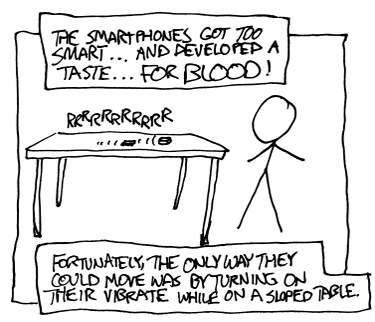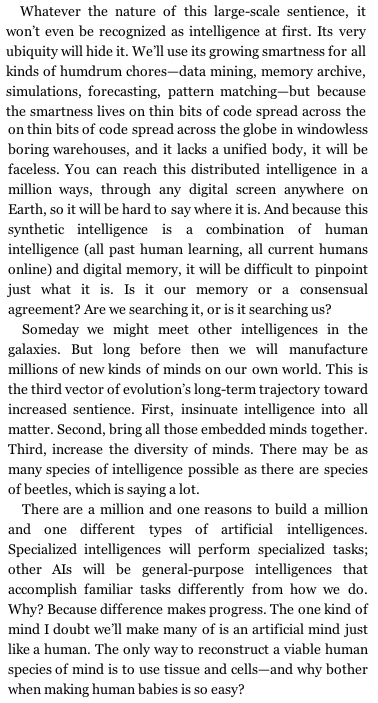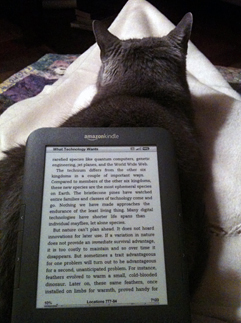
[excerpted from today’s xkcd multi-post]
Or, as Kelly would explain it:

No genre is the new genre
By Molly Sheridan
“Technology is anything invented before you were born.”
“Technology is anything that doesn’t quite work yet.“
–Kelly jokes about how other people define technology
I admit that sometimes Kelly’s book made me nervous, like trapped on a speeding train nervous.
This was not the only pop culture parallel I drew. One of the points he grounds his argument on is the idea that certain ideas and developments have been and will continue to be inevitable, in that they have historically been simultaneously and independently invented or evolved as solutions to certain challenges. Our world will not be stopped. Shades of the two almost-identical versions of the world in the sci-fy tv show Fringe, anyone?
Perhaps I found this idea particularly beautiful, as well as musically related, because it gave me repeated flashbacks to one of the most lovely quotes I can recall from a NewMusicBox composer interview. Wendy Carlos was talking about the power of music and she noted:
And an essential part of music is to connect with our shared inner feelings, to recognize the connections and know that you’re not alone. We’re born alone; we die alone. In between we have music, and a great gift it is, too. It’s in there with our social structures: families and friends and loved ones, a shared humanity. I like to think of it as the old metaphor of two ships at sea. We flash our signal lights as we pass one another. It makes life less lonely. It’s wired into us. If music were taken away from us, I do believe we would invent it again. In a few generations, we would develop it all over again.
By Molly Sheridan
 What Technology Wants was the first book I purchased for my Kindle, and considering I’m a feet-dragger when it comes to new tech tools (the reader was a gift from my husband) the reverse concept was never far from my mind as I read: Yeah, and what about what I want from technology?
What Technology Wants was the first book I purchased for my Kindle, and considering I’m a feet-dragger when it comes to new tech tools (the reader was a gift from my husband) the reverse concept was never far from my mind as I read: Yeah, and what about what I want from technology?
What Matthew suspects is correct: Kelly will hold to the idea that progress is always a good thing, no matter what, to the very end of the book. I thought his arguments as to why that was might make for some interesting discussion here. He says, repeatedly, that because new technology increases choice, it is always good, no matter its dueling positives and negatives. As someone who regularly laments our society’s consumerist focus and my own (admittedly romanticized) interest in simpler living, this did not resonate for me at first, but later he acknowledged my anxiety:
It is true that too many choices may induce regret, but “no choice” is a far worse option. Civilization is a steady migration away from “no choice.” As always, the solution to the problems that technology brings, such as an overwhelming diversity of choices, is better technologies. The solution to ultradiversity will be choice-assist technologies. These better tools will aid humans in making choices among bewildering options. That is what search engines, recommendation systems, tagging, and a lot of social media are all about. Diversity, in fact, will produce tools to handle diversity
While this did not totally alleviate my issues with his “more is more and therefore always good” stance, I saw his point. And Kelly himself says in several places that he wants everything to be available, but then allows only a small curated list of items into his own life.
As for the anthropomorphic issue, I started to buy into that much more easily once it was clear that this wasn’t a case of whether technology wanted chocolate or vanilla, but rather the idea that by understanding certain trends in development to date (trumpets, helmets, light bulbs), we might be better equipped to anticipate new technology and prepare for it. I took that to mean that we could better avoid disruptors like Napster and Pirate Bay in the future. Kelly writes:
The better we can forecast, the better we can be prepared for what comes. If we can discern the large outlines of persistent forces, we can better educate our children in the appropriate skills and literacies need for thriving in that world. We can shift the defaults in our laws and public institutions to reflect that coming reality.
For example, if technology is going to “want” to mess around with human genes–and we can probably say more confidently that it will with every advance in genetic mapping that comes along–then what do we need to be thinking about ethically, morally, and technologically today before we get there? In a way, it’s kind of adopting the Amish way of integrating new technologies: a way to contemplate their impact on the community before adopting them whole hog, thereby avoid some negative consequences.
I also came around to some of his discussion in this area once he clarified that he was thinking not of some super robot that we were about to build and endow with extraordinary independent AI, but rather he was anticipating the ways technology was going to make humans smarter/more efficient/etc. through augmentations, whether than means a smarter skillet or a smarter search engine.
What I was really searching for was a way to reconcile the technium’s selfish nature, which wants more of itself, with its generous nature, which wants to help us to find more of ourselves….Yes, technology is acquiring its own autonomy and will increasingly maximize its own agenda, but this agenda includes–as its foremost consequence–maximizing possibilities for us.
an ArtsJournal blog
